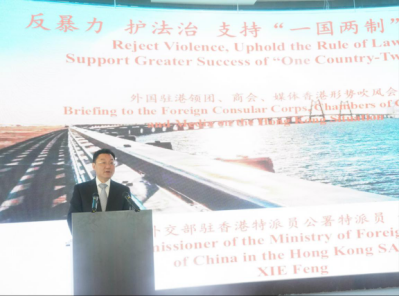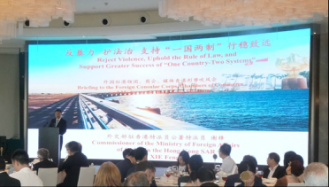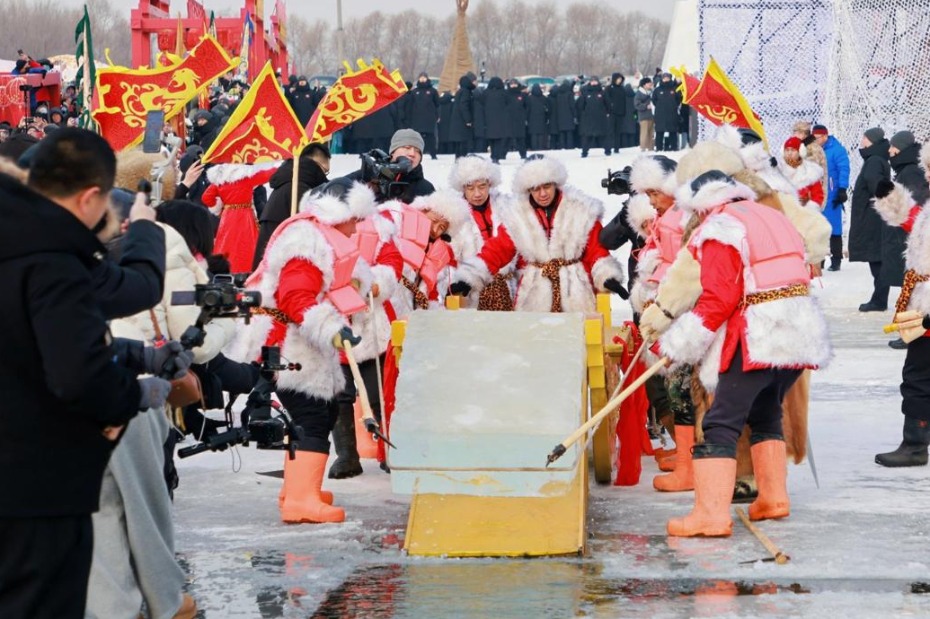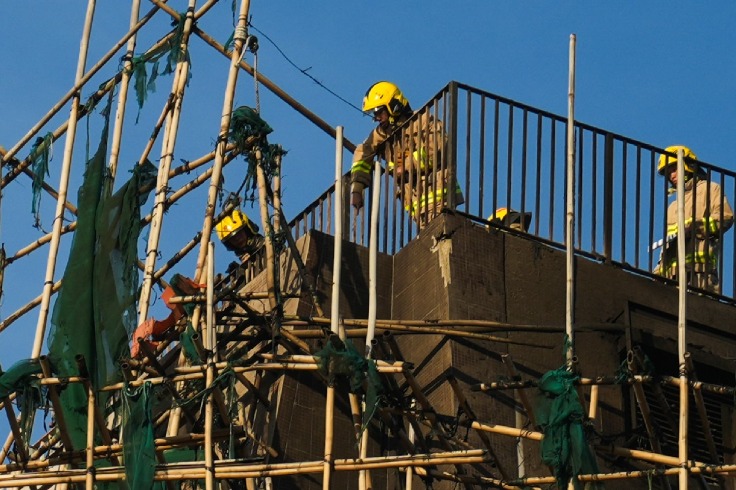Reject violence, uphold the rule of law, and support greater success of "One Country, Two Systems"

Speech by H.E. Mr. Xie Feng
Commissioner of the Ministry of Foreign Affairs of China
in the Hong Kong SAR
at the Luncheon for Foreign Institutions in Hong Kong
30 August 2019, Zhuhai

Dear Friends from the Consular Corps, Foreign Chambers of Commerce and the Media,
Welcome again to this event organized by the Commissioner's Office. It has two main purposes. First, it is to update you on the Hong Kong situation, which I believe all of you are closely following, so that you may know what is truly going on in the city and better understand the position of the Central and the SAR governments. Second, it is to offer a glimpse into the bright prospects of the Guangdong-Hong Kong-Macao Greater Bay Area, with visits to the Hong Kong-Zhuhai-Macao Bridge, one of the "seven wonders of the modern world", and the Traditional Chinese Medicine Science and Technology Industrial Park of Cooperation between Guangdong and Macao.

I want to make the following six points.
First, the non-intervention principle should be earnestly observed in state-to-state relations.
In the early 17th century, Hugo Grotius, founding father of international law, proposed the principle of sovereign equality, which emphasizes that states, big or small, strong or weak, have equal rights and obligations, thus laying the foundation of post-Westphalian international relations. The non-intervention principle came into being as the necessary requirement of sovereign equality.
As the renowned international lawyer Vattel argued, "It is an evident consequence of the liberty and independence of nations, that all have a right to be governed as they think proper, and that no state has the smallest right to interfere in the government of another. Of all the rights that can belong to a nation, sovereignty is, doubtless, the most serious, and that which other nations ought the most scrupulously to respect."
Sovereign equality and non-intervention have been established as basic principles of modern international law and norms governing international relations. The Declaration on Principles of International Law adopted by the UN General Assembly (UNGA) in 1970 states that "Every State has an inalienable right to choose its political, economic, social and cultural systems, without interference in any form by another State", and that "No State or group of States has the right to intervene, directly or indirectly, for any reason whatever, in the internal or external affairs of any other State."
Other declarations adopted by the UNGA, including the Declaration on the Inadmissibility of Intervention in the Domestic Affairs of States and the Protection of Their Independence and Sovereignty, the Declaration on Principles of International Law concerning Friendly Relations and Co-operation among States in accordance with the Charter of the United Nations, and the Declaration on the Inadmissibility of Intervention and Interference in the Internal Affairs of States, also point out that States have the duties to "refrain from the exploitation and the distortion of human rights issues as a means of exerting pressure on other States or creating distrust and disorder within and among States or groups of States", to "abstain from any defamatory campaign, vilification or hostile propaganda for the purpose of intervening or interfering in the internal affairs of other States", and to "refrain from any action or attempt in whatever form or under whatever pretext to destabilize or to undermine the stability of another State or of any of its institutions".
International law clearly defines the functions of diplomatic agents and consular officers who officially represent the sending State in the receiving State, requiring them not to interfere in the internal affairs of the receiving State. Article 41 of the Vienna Convention on Diplomatic Relations and Article 55 of the Vienna Convention on Consular Relations stipulate that it is the duty of diplomatic agents and consular officers "to respect the laws and regulations of the receiving State", and "not to interfere in the internal affairs of that State". And as the International Court of Justice explained, the principle of non-intervention was established "for, from the nature of things, it would be reserved for the most powerful States, and might easily lead to perverting the administration of international justice itself". The observation lays bare hegemony at the core of intervention.
Throughout history, many developing countries including China have suffered a lot from intervention by foreign powers. As the most recent example, some countries have grossly interfered in Hong Kong affairs, which are China's domestic affairs, and even threatened to cancel economic and trade privileges of Hong Kong and sanction SAR Government officials. Politicians of certain Western countries, including government officials, congressmen and consular officers in Hong Kong, have frequently met with radical activists calling for so-called "Hong Kong independence", applauded violence as "a beautiful sight to behold", made unfounded allegations against the Hong Kong police, groundlessly accused Beijing of "encroaching on Hong Kong people's autonomy and freedom", and even boasted that their diplomats "meet with opposition protesters, not just in Hong Kong or China". Such remarks and actions have flagrantly defied the principle of non-intervention, and trampled upon international law and basic norms governing international relations.
Intervention is a serious violation of international law, which puts common interests of all countries at risk and breeds chaos around the globe. We call on the forces for justice in the world who cherish peace and the rule of law to unite behind the basic principles of international law and norms governing international relations, including non-intervention, and jointly uphold the international order based on international law.
Second, it is simply wrong to cite the Sino-British Joint Declaration to justify interference in Hong Kong affairs.
In recent months, certain countries have frequently cited the Sino-British Joint Declaration on the Question of Hong Kong to justify their right to "supervise" Hong Kong affairs. But anyone who has studied the instrument knows well such claims do not hold water.
The Joint Declaration is an important instrument between China and the UK on China's resumption of the exercise of sovereignty over Hong Kong and arrangements for the transitional period. No single clause in it grants the UK any right to interfere in Hong Kong affairs after its return, and all clauses concerning the UK have been fulfilled.
Firstly, the Joint Declaration consists of eight paragraphs and three annexes. Article 1 is about China's decision to resume the exercise of sovereignty over Hong Kong. In Article 2, the UK states that it will restore Hong Kong to China. These two articles have been fulfilled upon the return of Hong Kong. In Article 3 and Annex 1, China elaborates its basic policies regarding Hong Kong, yet with not the least implication of UK's rights and obligations. Articles 4, 5 and 6 and Annexes 2 and 3 provide for relevant arrangements during the transitional period, including the administration of Hong Kong, the establishment and operation of a Sino-British Joint Liaison Group, land leases and ratification. Articles 7 and 8 are about the implementation and entry into force of the instrument. All these provisions have been fulfilled with the return of Hong Kong and the completion of ensuing work.
Secondly, the basic policies regarding Hong Kong elaborated in the Joint Declaration were proposed by China on its own and hence are completely China's domestic affairs, rather than an agreement between the two sides. As Article 3 of the instrument clearly states, "The People's Republic of China has decided to establish, in accordance with the provisions of Article 31 of the Constitution of the People's Republic of China, a Hong Kong Special Administrative Region upon resuming the exercise of sovereignty over Hong Kong." It shows that the legal basis of implementing "One Country, Two Systems" in Hong Kong is China's Constitution, instead of the Joint Declaration.
Thirdly, the Joint Declaration includes no clause that provides for British obligations to Hong Kong after the city's return. All legal relations between the UK and Hong Kong created by the instrument had terminated by 1 January 2000 at the latest, when the Sino-British Joint Liaison Group ceased operation. The UK is not entitled to claim any new rights over or obligations to Hong Kong by citing the Joint Declaration. To be brief, the UK has no sovereignty, jurisdiction or right of "supervision" over Hong Kong whatsoever after the latter returned to China.
It needs to be pointed out that the Joint Declaration is a bilateral instrument between China and the UK and does not concern any other country. According to general international law, other countries and organizations have no right to meddle with Hong Kong affairs on the pretext of the Joint Declaration.
Third, it is important to fully and accurately understand "One Country, Two Systems" from a legal perspective.
The policy of "One Country, Two Systems" was put forward by the Chinese Government itself. It is a pioneering initiative based on the principles of sovereign equality and peaceful settlement of disputes in international law, and is a major contribution by China to developing international law. In order to fully and accurately grasp the policy, it is necessary to understand at least two points.
Firstly, it is China's Constitution that lays the very foundation of the HKSAR. The HKSAR where "One Country, Two Systems" is practiced was established according to China's Constitution. As early as in 1982, two years before the Sino-British Joint Declaration was signed, China's Constitution provides that "The state may establish special administrative regions when necessary." The Basic Law of the HKSAR codifies the "One Country, Two Systems" policy into law with concrete provisions. Therefore, the Constitution of the PRC and the Basic Law of Hong Kong together constitute the constitutional basis of the HKSAR. Focusing solely on either of the laws or separating and even confronting the two is incomplete and misleading, and inconsistent with the reality since Hong Kong's return.
Secondly, we need to correctly understand the relationship between "One Country" and "Two Systems". "One Country" is the foundation of and prerequisite for "Two Systems", and "Two Systems" can only operate within the framework of "One Country". Article 1 of the Basic Law makes it clear that "The Hong Kong Special Administrative Region is an inalienable part of the People's Republic of China", and Article 12 provides that "The Hong Kong Special Administrative Region shall be a local administrative region of the People's Republic of China, which shall enjoy a high degree of autonomy and come directly under the Central People's Government." It fully demonstrates that Hong Kong is part of China rather than an independent or semi-independent political entity, and that the Central Government has overall jurisdiction over Hong Kong, while Hong Kong enjoys a high degree of autonomy under the Basic Law. Should the "One Country" principle be undermined, "Two Systems" would not materialize. As a local administrative region of China, Hong Kong has the constitutional responsibility of upholding national unity and territorial integrity, and defending national sovereignty and security. Any attempt to endanger China's sovereignty and security, challenge the power of the Central Government and the authority of the Basic Law, or use Hong Kong to carry out infiltration and sabotage activities against the mainland is absolutely impermissible.
Our position is clear and consistent. We respect the differences between the "Two Systems" on the basis of "One Country", and ensure a high degree of autonomy in Hong Kong in accordance with law.
Looking back at the more than 150 years when Hong Kong was under British colonial rule, we will find that no single Governor was democratically elected by the local people, and legislature members were appointed by the Governor most of the time. The people of Hong Kong today, by contrast, are their own masters and govern affairs within the limits of the SAR's autonomy in accordance with law. Anyone without bias will not deny that the citizens of Hong Kong are enjoying unprecedented democratic rights and freedoms. But some people continue to claim "rights" that never existed in Hong Kong, and even accuse China's Central Government of "eroding" these "rights". Such argument is legally groundless and inconsistent with the reality, and has again exposed their prejudice, arrogance and hypocrisy.
Fourth, it is imperative for the international community to reject violence in unison.
In recent months, some radical extremists in Hong Kong have run amok and committed violent crime on the pretext of opposing the amendments. Their actions have pushed the city to the verge of a very dangerous situation.
Hong Kong is reputed to be a paradise for gourmets, shoppers and hikers. But at recent weekends, we are not even sure if it is safe enough to go out or if public transport remains in operation. The frantic street riots have shown early signs of terrorism and posed a grave threat to every innocent citizen, including each of us here.
The chaos has also dealt a heavy blow to Hong Kong's economy. It is estimated that each day of paralysis costs the airport cargo worth HK$10 billion. The occupancy rate of the hotels has plummeted further by 30% in July and August, as the number of tourists are down by 31% year on year. The catering business has lost HK$3.5 billion revenue over the past three months. Cargo export fell by 5.4% in the second quarter. Two large enterprises have postponed plans for multibillion-dollar share listing in Hong Kong. And the SAR Government has slashed its 2019 growth forecast from a previous estimate of 2% to 3% to a range of 0% to 1%.
To our strong indignation, some individuals, media, organizations and countries have deliberately confounded peaceful demonstrations with violent crime, and the extremists' offenses with the police's law enforcement efforts. They have distorted the truth by glorifying the violent crime and smearing the Hong Kong police, which fully shows their double standard and lack of the basic sense of justice or morals. As a result, the rioters have been greatly emboldened, and the situation continues to worsen.
Violence is a common enemy of civilized society, and a chaotic Hong Kong with a frail economy produces no winner. I believe the reason why your countries have consular missions and businesses in Hong Kong is that you want to tap into the development opportunities here, instead of living in anxiety and seeing the city going downhill. Therefore, everyone with a sense of justice, who aspires to a better future for Hong Kong and themselves, should speak up against violence. If the turbulence lasts, it would be the Hong Kong citizens, the misled and manipulated youth, and all stakeholders including international businesses that have to pay the price.
Fifth, it is vital to restore the rule of law to Hong Kong as soon as possible.
The rule of law is the foundation of social justice, security and order, and the shared aspiration of humankind. As a long-cherished core value of Hong Kong, it is also the cornerstone for the city's prosperity and stability. Some people, however, have kept undermining the rule of law in an almost hysterical manner, solely to serve their selfish interests and hidden political agenda.
Law-abidingness is the basic element of the rule of law. Every citizen of civilized society shall abide by the law and is equal before the law. Individual rights are protected by the law, but only to the extent that they do not prejudice other citizens' lawful rights and the public interests.
What we have seen recently, though, is that the violent extremists have shown no regard for the law. They openly held illegal rallies and demonstrations while the time, venue and routes were unauthorized, crippled the airport, blocked traffic, besieged police stations, and vandalized LegCo and other public facilities. They even bit off a police officer's finger, doxxed and intimidated over 1,600 police officers and their families, and beat up innocent tourists, journalists and passengers. Such astonishing violence, I believe, constitutes crime and deserves severe punishment in any country.
History has taught us repeatedly that the evil often comes disguised as the good. As Madame Roland famously lamented before being executed in the French revolution, "Oh Liberty! What crimes are committed in thy name!" Another saying goes that "Violence starts where law falls silent." The minority of people who are trampling upon the law in the name of "freedoms" have deprived the majority of their freedoms to lead normal lives, and will only plunge civilized society back into the abyss where the law of the jungle prevails. This is what is at stake when the rioters are chanting "violate the law for the sake of justice". It is like drinking poison to quench thirst, and will only breed evil.
Look at the violent extremists and those behind the scenes: they often mask their faces, sneak in darkness and hold foreign passports, ready to get away anytime. Clearly aware of their wrongdoing, they try to shirk the responsibilities by instigating those ignorant of the truth, and taking the youth as hostage and scapegoat for their insidious plots. How sinister it is!
Dear friends,
The current problem in Hong Kong is in no way about human rights, freedoms or democracy. Instead, it is about whether the rule of law should remain cherished, whether aspirations should be expressed in a lawful way, and whether criminals should be held accountable in accordance with law. Should the violent offenders be allowed to keep undermining the rule of law "for the sake of justice" as they claim with impunity, it would not only be detrimental to the peace, tranquility and prosperity of Hong Kong, but also represent a degradation of human rights, freedoms, democracy and the rule of law, and an outrageous assault on human civilization and justice.
Sixth, it is important to support dialogue and oppose coercion or blackmail.
No one is more willing than Chief Executive Carrie Lam to engage in dialogue. Since the amendment bill was proposed, the SAR Government had solicited public opinion widely and made substantive adjustments to the draft in response to the concerns of various parties. In May, Mrs. Carrie Lam met several times with many of you from consular corps and chambers of commerce to seek your advice. In mid-June, after the bill aroused heated debate, the SAR Government decided on suspending the legislative exercise. Since then, Mrs. Carrie Lam has stated on many occasions that the SAR Government is ready to have dialogue with people from all walks of life in a very sincere and humble manner. A few days ago, she announced starting immediately a platform for dialogue, encouraging people of various sectors, political stances and age groups to have continuous dialogue. She also expressed readiness to reach out to as many citizens as possible who are of different backgrounds and political stances, including those who participated in the demonstrations, so as to boost mutual understanding through dialogue and communication and find a way out together. Shouldn't we applaud such an open and inclusive attitude of the Chief Executive and the SAR Government?
In stark contrast, the opposition and the extremists will never feel satisfied. They have refused dialogue unless their "five demands" are met, and coerced the SAR Government with escalating violence. Despite the letter of objection issued by the SAR police, the opposition and the radicals have insisted on taking to the streets on August 31, a sensitive date, to provoke confrontation and violence. This is by no means the right attitude to start a dialogue.
For a serious dialogue to happen, various sides need to show mutual respect, openness and inclusiveness, and work out a constructive solution through rational consultation. Response does not mean compromise, and no prerequisite should be set. If one side already draws conclusions before talking and presses the other side to accept each and every demand, it would not be dialogue, but flagrant blackmail. The recent developments have made it increasingly clear that the extremist and radical forces, who appear to be crying for dialogue, are in fact obstructing the process. Their true aim is not to oppose the amendments or seek dialogue, but to overthrow the legitimate SAR Government, seize power through illegal means and challenge the red line of "One Country, Two Systems". Be alert, so that you will not be deceived by their tricks, still less manipulated by them.
Dear friends,
This year marks the 22nd anniversary of Hong Kong's return to the motherland. Over the years, the policies of "One Country, Two Systems", "the people of Hong Kong governing Hong Kong" and a high degree of autonomy have been faithfully and effectively implemented. That said, the city has also seen difficult times, but it has always managed to get through and emerged stronger from every crisis with the firm support of the Central Government and people in the mainland.
As we speak, Hong Kong is in the direst situation since its return. The Central Government firmly supports the SAR Government led by Chief Executive Carrie Lam in governing according to law, firmly supports the Hong Kong police and judiciary in decisively enforcing the law and fairly administering justice, and firmly supports the majority of Hong Kong compatriots in their just cause of opposing violence, upholding the rule of law, and supporting the police. The Central Government has sufficient capabilities to quickly calm down any possible chaos. Any plot to mess up Hong Kong, undermine its prosperity and stability, and challenge "One Country, Two Systems" is doomed to fail.
Let me reiterate: Hong Kong is part of China, and its affairs are completely China's domestic affairs. Any interference by foreign government, organization or individual will be resolutely countered by all Chinese people, including our Hong Kong compatriots. We call on the international community to speak up against extremist violence, and support the SAR Government in stopping violence, ending the chaos and restoring order. We also call on all countries, businesses and people with insight who hope for prosperity and stability in the city to take an active part in the Greater Bay Area initiative, seize the historic opportunities, and work together for a brighter future.
Thank you.
- China's top political advisor meets delegation of A Just Russia party
- Pooled efforts expected to deepen reforms in Hong Kong with new legislature elected
- Nanfeng mandarins of Jiangxi are going global
- Former senior official of Guangxi expelled from Party
- Former CPPCC official Bi Jingquan dismissed from office
- Man detained for allegedly hugging unfamiliar girl in Guangdong park



































